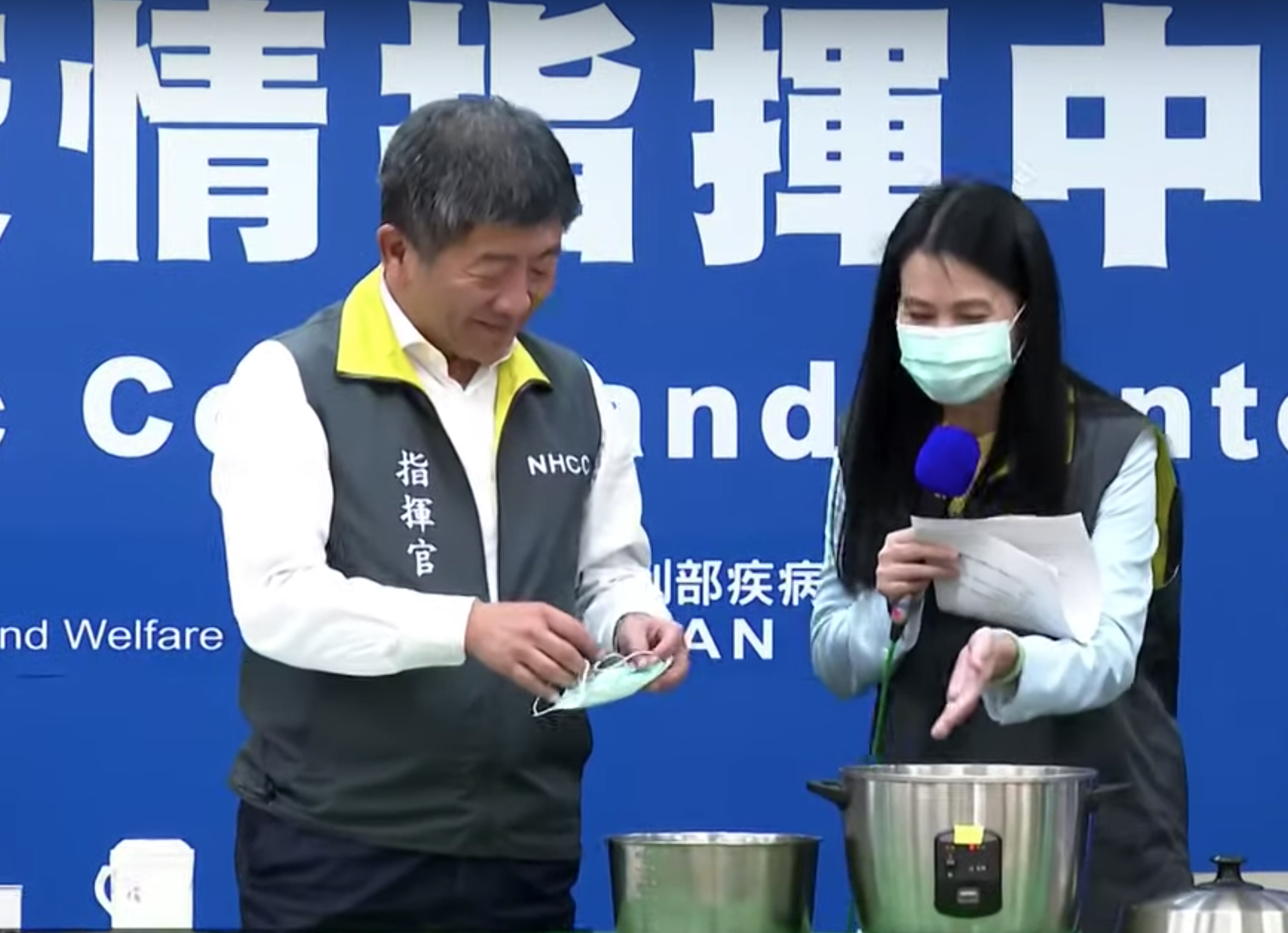Coronavirus: Taiwan health authorities give tips on how to make masks last longer
Sign up now: Get insights on Asia's fast-moving developments

Taiwan's Health Minister Chen Shih-chung (left) demonstrates how to disinfect a mask with a steamer.
PHOTO: TAIWAN'S CENTRAL EPIDEMIC COMMAND CENTER
Katherine Wei
Follow topic:
TAIPEI - Taiwan's government-monitored mask production has grown steadily to keep residents supplied with at least three disposable masks a week, but before manufacturers can take on a bigger production load, the health authorities have announced ways to make a mask last for as long as possible.
At a press conference on Sunday (April 5), Taiwan's Health Minister Chen Shih-chung had an electric steamer placed next to him.
He explained that the steamer, commonly used in Taiwanese households, comes in handy amid the shortage of masks, as steaming would disinfect them and allow for more than one use.
"Starting April 9, people can buy nine masks every 14 days, which should be enough. But we're still hoping that everyone could use them sparingly, so the Food and Drug Administration (FDA) has provided a way to extend the lifespan of a mask," said Mr Chen, who proceeded to demonstrate how to disinfect a medical-grade mask using the steamer.
According to the FDA, the mask should not be placed directly in the steamer. Instead, a metal rack should be placed in it and an inner pot put on top, with the mask lying flat on the bottom of the pot. Both the metal rack and inner pot come with the steamer.
Instead of adding water to the steamer, as one would do when steaming food, this method of disinfecting a mask does not require water - dry heating is the way to go.
Said FDA director-general Wu Shou-mei: "We're reminding everyone not to add water, as this will damage the layer with static electricity. As for those asking if rubbing alcohol can be used to disinfect (masks), it's actually not the best because this affects the same layer, too."
She was referring to the middle layer of the three-ply medical masks, which filters out the bacteria.
The steamer will automatically switch off after three minutes, but keep the lid on for another five minutes for maximum sterilisation before taking the mask out, and wait for the steamer to cool down completely before steaming the next mask, she said.
"If a mask is visibly soiled or has any tears or rips, we suggest just throwing it away. For people with respiratory or chronic illnesses and those visiting hospitals, masks should be discarded after one use," Ms Wu added.
The method has been tested by the FDA and Associate Professor Lai Chane-yu from Chung Shan Medical University's Department of Occupational Safety and Health.
According to both FDA officials and Prof Lai, each mask can be steamed three to five times before becoming ineffective.
In the experiments, the masks retained up to 99 per cent of its original Bacterial Filtration Efficiency (BFE) after three to five steams, said Ms Wu.
Past reports in Hong Kong and China have panned the steaming of masks, citing experts who said it does not sterilise them as claimed by some people online.
Many Taiwanese netizens responded to Sunday's press conference's live demonstration, with some expressing concerns that any germs from the mask might contaminate the steamer while others wondered if other alternatives will work.
Prof Lai said: "The inner pot will reach 165 deg C (during steaming) and will kill the bacteria we want to kill, while the steam itself is 110 deg C. If you're worried you can wash the pot afterwards."
Can other cooking appliances like ovens, air fryers or microwaves be used in place of the steamer?
Prof Lai said they might be worth a try if the temperature can be controlled at 110 deg C, but warned that microwaving a mask might set it on fire.
"I would advise storing masks you took off temporarily in a dry, airy environment and not store it in a sealed plastic bag; this would cause bacteria to multiply. You can use a plastic folder or a paper bag but avoid touching the mask with your hands," he added.
But how would you remove a mask without touching it? Several Taiwanese doctors, nurses and pharmacists have published articles or uploaded videos instructing people to remove masks only by the elastic bands on both sides so as not to touch any of the bacteria on the outer layer of the mask.
Since the Cabinet banned medical-grade mask exports in late January, Taiwan's government has stressed the need of equipping oneself with only medical-grade masks, as they have the highest possible BFE compared to activated carbon masks and cloth masks that were also popular in Taiwan prior to the Covid-19 outbreak.
On Sunday, however, Ms Wu said using cloth masks made of non-woven material that can be washed after each use is acceptable only if one is going to open-air, low-risk locations like parks.

